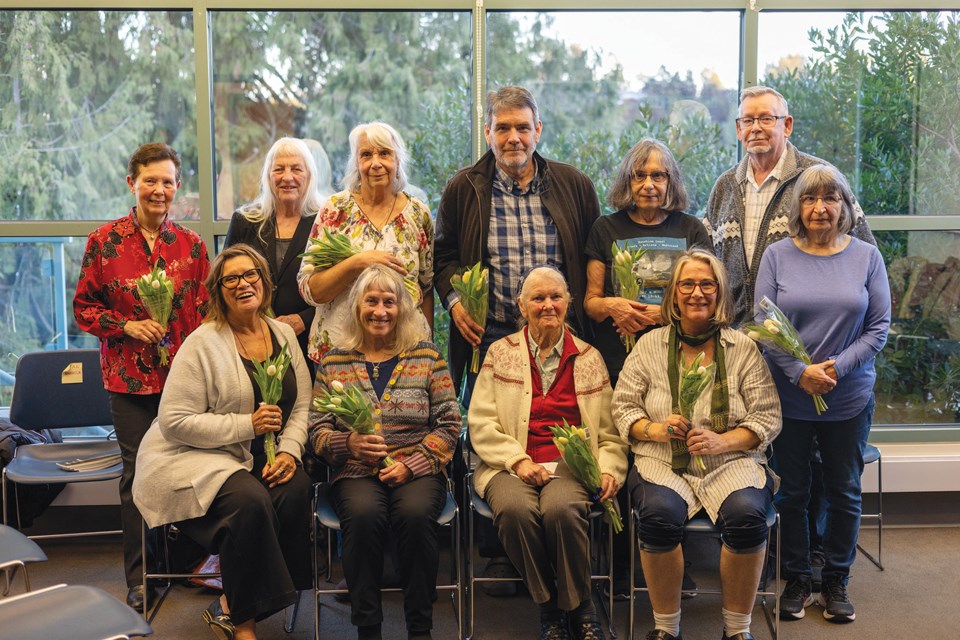A dozen poets converged on the Gibsons Public Library this month for a series of live readings prompted by National Poetry Month.
National Poetry Month was established in Canada in 1998 by the League of Canadian Poets and takes place every April. The event unites schools, publishers, booksellers, literary organizations, libraries, and poets from across the country in a celebration of the primacy of poetry in Canadian culture.
For 2024, the League selected “weather” as the month’s theme. Works by Sunshine Coast poets included reflections on meteorological conditions across the country.
The public gathering on April 17 was the latest in a series of Poets Abounding events organized by the library to foster original poetry on the Sunshine Coast.
Fran Bourassa, a poet who hosts periodic free writing workshops at the Gibsons library and has contributed to numerous anthologies, shared verses inspired by the climatic contrasts of the Quebec countryside. In a piece titled Heat Wave, she evoked the landscape of her childhood: “It’s the kind of day that tempers rise / and the black streets shimmer with the broil of it. / Our fathers, quick with the backhand, our mothers drive us away / We wait for a sign that it’s safe to move.”
Poet and photographer Jane Covernton read from her newly-completed book After the End Times: Imagining the Future, which was released in March and completes her trilogy of volumes on apocalyptic themes.
“I was maybe a little ahead of the collective understanding of the climate crisis, and all the other crises that we’re now calling the poly-crisis,” Covernton said. Her poem Rain Moves included the portentous lines “Rain moves across water / through bright patch of sunlight / dark slanting storm coming this way.”
Verses by Monica Davis were written in response to photography by Ramona Hartley. The two collaborated during the 2023 Art and Words Festival organized by the Sunshine Coast Writers and Editors Society. “The sea is calm, flat calm / It is illusory: Nature’s attempt to inveigle us into forgetfulness,” read Davis.
The sea also flowed into the subject matter of multi-instrumentalist, singer and composer Jon Eriksson. “My style is connected to music,” Eriksson explained, “because I’ve written a lot of lyrics for songs. Some of my poems are written with melodies in mind.”
Maggie Guzzi read verses by both herself and her husband David Phillips. Phillips’s weather-related stanzas opened with an allusion to T.S. Eliot’s The Waste Land: “April, mid-month / Sun at seven p.m. / Cruel warmth / Lived paradise / Three years old, I knew / I knew this crystal bite of this light.”
Other presenters included Heidi Greco (inspired by her childhood heroine Princess Summerfall Winterspring) and Ross Harry (“Well, here we go again / Spring is finally here / Let’s see what made the winter / And what comes to life again”). Lines by Rosella Leslie described distinctive West Coast locales like the seaside (“Along the beach an ebbing summer tide / abandons bits of drift and oyster shells”) and the brooding mountains of Whistler in late autumn.
Author and songstress Catherine McNeil read from her 2023 book Emily and Elspeth, while Anne Miles dug into her catalogue of early works for reflections on “snow light” and storms. Rosa Reid’s The Icebreaker analyzed the Canadian appetite for weather-related discourse: “Is it cold enough for ya? / Ha ha. / I agree. It’s a mantra around the world, breaking the silent longing of everyone on Earth / to be seen, to be heard, to be accepted, and understood.”
Sheila Weaver, who two days later would appear in the Speech Arts discipline of the Sunshine Coast Festival of the Performing Arts, concluded the event by sharing complementary works by herself and her mother (who wrote in the early 20th century).
Weaver is a horticulturalist who tends gardens at the Gibsons museum and Heritage Playhouse. Her imagery reflects an intimate knowledge of local fora: “Maple and cedar, salmonberry, fern / Hold out green arms and Earth, thus sheltered, breathes, sighs, offers her great body to receive / And rain sinks gently in.”




